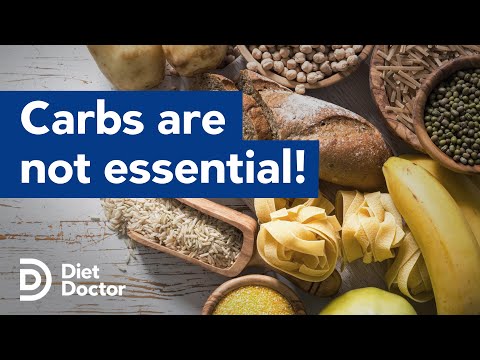Table of Contents
Carbohydrates, often referred to as carbs, have been both praised and demonized in the world of nutrition. However, they play an undeniably crucial role in our diets as one of the primary sources of energy for the body. In this article, we will delve into the realm of essential carbohydrates, exploring their significance, types, sources and how they provide the energy our bodies need to thrive.
Certainly, carbohydrates, often abbreviated as “carbs,” have indeed been a topic of ongoing debate and discussion in the realm of nutrition. Let’s delve deeper into the world of essential carbohydrates to understand their critical role in our diets and how they serve as a fundamental source of energy for the body.
The Significance of Essential Carbohydrates:
Energy Production: Carbohydrates are a primary source of energy for the human body. When consumed, they are broken down into glucose, which is used by cells for fuel. Glucose is particularly vital for the brain and muscles, providing the energy needed for cognitive functions and physical activities.
Macronutrient Balance: Carbohydrates are one of the three macronutrients, alongside proteins and fats, that make up our diets. Achieving a balanced intake of these macronutrients is crucial for overall health. Carbs provide a readily available and efficient source of energy, especially during high-intensity exercises and daily activities.
Dietary Fiber: Carbohydrates also encompass dietary fiber, which is essential for digestive health. Fiber helps maintain regular bowel movements, prevents constipation and supports a healthy gut microbiome. It can also contribute to a feeling of fullness, aiding in weight management and appetite control.
Types of Carbohydrates:
Simple Carbohydrates: These are often referred to as sugars and are found naturally in foods like fruits (fructose) and milk (lactose). They are also present in refined forms in candies, pastries and sugary beverages. While simple carbs provide quick energy, it’s important to consume them in moderation due to their potential to cause rapid blood sugar spikes.
Complex Carbohydrates: Complex carbs consist of long chains of sugar molecules and are found in foods like grains (e.g., rice, wheat, oats), legumes (e.g., beans, lentils) and starchy vegetables (e.g., potatoes, sweet potatoes). They are a more sustained source of energy and are often rich in vitamins, minerals and dietary fiber.
Sources of Essential Carbohydrates:
Whole Grains: Foods like brown rice, whole wheat bread, quinoa and oats are excellent sources of complex carbohydrates. They offer sustained energy and are nutrient-dense.
Fruits and Vegetables: These provide a combination of simple and complex carbohydrates along with a plethora of vitamins, minerals and antioxidants. They are essential components of a healthy diet.
Legumes: Beans, lentils and chickpeas are rich in complex carbohydrates, fiber and plant-based protein.
Dairy: Milk and yogurt contain lactose, a natural sugar, making them sources of carbohydrates. They also offer calcium and protein.
Thriving with Essential Carbohydrates:
Balanced Diet: A balanced diet includes an appropriate intake of carbohydrates, proteins and fats. The ratio may vary depending on individual dietary needs, activity levels and health goals.
Preventing Energy Imbalances: Carbohydrates help prevent energy imbalances, ensuring you have enough energy to perform daily tasks and exercise. Athletes, in particular, rely on carbs to fuel their workouts.
Mindful Choices: Opt for complex carbohydrates from whole, unprocessed foods to reap the nutritional benefits while minimizing added sugars and refined carbs.
In conclusion, essential carbohydrates are a vital part of our diet, serving as a key source of energy, maintaining macronutrient balance and supporting overall health. Understanding the different types of carbohydrates and making informed dietary choices empowers individuals to harness the energy and nutritional benefits that carbs offer while promoting well-being and vitality.
If you’d like to dive deeper into this subject, there’s more to discover on this page: Breakfast – Better Health Channel
The Role of Carbohydrates
Carbohydrates are one of the three macronutrients, alongside proteins and fats, that make up our daily dietary intake. While they have been somewhat misunderstood and sometimes even vilified in recent diet trends, carbohydrates are, in fact, the body’s preferred source of energy. They provide glucose, a form of sugar, which is easily converted into energy to fuel various bodily functions.
Carbohydrates, a fundamental macronutrient, stand alongside proteins and fats, forming a vital part of our daily dietary intake. Despite misconceptions and occasional demonization in recent diet trends, carbohydrates remain the body’s preferred and primary source of energy. When consumed, carbohydrates are broken down into glucose, a type of sugar that serves as a quick and easily convertible form of energy. This glucose is then readily utilized to fuel a multitude of bodily functions, supporting everything from basic metabolic processes to physical activity and mental cognition.
Understanding the essential role that carbohydrates play in providing energy can help reshape our perspective and approach to a balanced diet. Rather than fearing or eliminating carbohydrates, it’s crucial to embrace them as a necessary and valuable component of a well-rounded, energizing diet. Balancing carbohydrate consumption with the right types of foods, focusing on whole grains, fruits and vegetables, can ensure that our bodies receive the energy they need to function optimally, promoting overall health and vitality.
For additional details, consider exploring the related content available here Healthy Eating As You Age: Know Your Food Groups | National …

Carbohydrates come in two main categories
simple carbohydrates and complex carbohydrates.
Carbohydrates, the essential energy source that fuels our daily activities and bodily functions, can be broadly categorized into two main types: simple carbohydrates and complex carbohydrates. Understanding the distinction between these two forms of carbs is fundamental to making informed dietary choices and optimizing our overall health.
Simple Carbohydrates:
Simple carbohydrates, often referred to as “simple sugars,” consist of one or two sugar molecules, making them easy for the body to break down and rapidly convert into glucose, a primary source of energy. Common sources of simple carbohydrates include:
Sugars: This category encompasses natural sugars found in fruits (fructose) and dairy products (lactose) as well as added sugars found in processed foods, sugary snacks and sweetened beverages (sucrose and high fructose corn syrup). While natural sugars are typically accompanied by fiber and other beneficial nutrients, added sugars provide empty calories and are linked to various health issues when consumed in excess.
Refined Grains: Foods made from refined grains, such as white bread, white rice and most breakfast cereals, are stripped of their bran and germ during processing, leaving behind mostly simple carbohydrates. These foods are digested quickly, leading to rapid spikes and crashes in blood sugar levels.
Complex Carbohydrates:
Complex carbohydrates, as the name suggests, are more structurally intricate than simple carbs. They consist of long chains of sugar molecules, which take longer for the body to break down and convert into glucose. This gradual release of energy provides sustained fuel for your body. Common sources of complex carbohydrates include:
Whole Grains: Foods like whole wheat bread, brown rice, quinoa, oats and barley are rich in complex carbohydrates. They retain their bran and germ, which are packed with fiber, vitamins, minerals and other nutrients. This fiber slows down digestion, helps regulate blood sugar levels and promotes digestive health.
Legumes: Beans, lentils, chickpeas and peas are excellent sources of complex carbohydrates. They’re also loaded with protein, fiber and various vitamins and minerals. The combination of complex carbs and protein in legumes provides a balanced source of energy and promotes feelings of fullness.
Vegetables: Many vegetables, such as broccoli, sweet potatoes and leafy greens, contain complex carbohydrates alongside a plethora of vitamins, minerals and dietary fiber. These carbs contribute to steady energy release and the fiber supports digestive health and satiety.
In summary, the differentiation between simple and complex carbohydrates lies in their molecular structure and how they affect our bodies. Simple carbs provide quick but fleeting energy, while complex carbs offer sustained and balanced energy, along with a wealth of essential nutrients. To support your overall health, it’s advisable to prioritize complex carbohydrates from whole, unprocessed foods, while limiting your intake of added sugars and refined grains. This balanced approach to carb consumption can help you maintain stable energy levels and promote better overall well-being.
Looking for more insights? You’ll find them right here in our extended coverage: Definitions of Health Terms: Nutrition: MedlinePlus

The Importance of Whole Grains
Whole grains are particularly significant when it comes to essential carbohydrates. Unlike refined grains (such as white bread and white rice), which have had the bran and germ removed during processing, whole grains retain all parts of the grain kernel, including the nutrient-rich bran and germ.
Whole grains offer a wealth of essential nutrients, including dietary fiber, vitamins (such as B vitamins), minerals (like magnesium and iron) and antioxidants. They not only provide a consistent source of energy but also support digestive health, regulate blood sugar levels and reduce the risk of chronic diseases like heart disease and type 2 diabetes.
To delve further into this matter, we encourage you to check out the additional resources provided here: Whole grains: Hearty options for a healthy diet – Mayo Clinic

Balancing Carbohydrates in Your Diet
Balancing carbohydrates in your diet is essential for overall health. While carbs are a primary source of energy, excessive consumption, especially of simple sugars and refined grains, can lead to weight gain and an increased risk of chronic health conditions.
Here are some tips for incorporating essential carbohydrates into your diet in a balanced way:
Maintaining a delicate balance of carbohydrates in your diet is key to fostering overall well-being. Carbohydrates, often hailed as the body’s primary source of energy, hold immense nutritional significance. However, it’s vital to tread thoughtfully, as excessive consumption, particularly of simple sugars and refined grains, can tip the scales toward weight gain and pave the path to chronic health conditions.
1. Prioritize Complex Carbs: Complex carbohydrates, found in whole grains like oats, quinoa and brown rice, offer a steady release of energy, keeping you fueled throughout the day. They also provide essential fiber, promoting digestive health and satiety.
2. Embrace Fruits and Vegetables: Incorporate a colorful array of fruits and vegetables into your diet. They not only supply carbohydrates but also offer a plethora of vitamins, minerals and antioxidants. These nutrients support overall health while adding natural sweetness to your meals.
3. Moderate Sugar Intake: Beware of added sugars in processed foods and sugary beverages. Limit your consumption of sweets, sugary snacks and sugary drinks, as they can contribute to weight gain and metabolic issues.
4. Include Legumes: Beans, lentils and chickpeas are excellent sources of carbohydrates. They’re also packed with protein and fiber, making them a filling and nutritious addition to your diet.
5. Balance with Protein and Healthy Fats: Complement your carbohydrate intake with lean protein sources like poultry, fish and tofu. Additionally, include healthy fats from avocados, nuts and olive oil to promote satiety and balance blood sugar levels.
6. Portion Control: Be mindful of portion sizes to avoid overconsumption. A balanced plate should consist of a variety of foods in appropriate proportions, ensuring you get the nutrients you need without excess calories.
7. Plan Balanced Meals: Create balanced meals that incorporate carbohydrates, protein and healthy fats. This approach helps maintain stable blood sugar levels and keeps you feeling satisfied.
8. Hydration Matters: Stay well-hydrated with water throughout the day. Sometimes, thirst can be mistaken for hunger, leading to unnecessary carbohydrate consumption.
9. Listen to Your Body: Pay attention to your body’s hunger and fullness cues. Eating mindfully can help you avoid overindulging in carbohydrates.
Balancing carbohydrates in your diet isn’t about restriction; it’s about making informed choices that promote both short-term energy and long-term health. By incorporating essential carbohydrates in a thoughtful and balanced manner, you can enjoy the benefits of sustained vitality while minimizing the risks associated with excessive carbohydrate intake. It’s a path to wellness that embraces both the pleasure of eating and the nourishment of your body.
Explore this link for a more extensive examination of the topic: Healthy Eating As You Age: Know Your Food Groups | National …

Choose Whole Grains
Opt for whole grain products like whole wheat bread, brown rice and whole grain pasta over their refined counterparts.
Certainly, here’s an extended idea:
“When it comes to making dietary choices that promote overall health and well-being, opting for whole grain products like whole wheat bread, brown rice and whole grain pasta over their refined counterparts is a simple yet profound step in the right direction. Whole grains are nature’s nutritional powerhouses, offering a plethora of benefits that go beyond their refined counterparts.
Whole grains, unlike refined grains, retain their bran and germ layers, which are rich in essential nutrients, fiber and phytochemicals. This natural completeness translates into numerous advantages for your health:
Fiber-Rich Goodness: Whole grains are a superb source of dietary fiber, which plays a pivotal role in digestive health. Fiber aids in regular bowel movements, prevents constipation and supports a healthy gut microbiome. Moreover, it helps in maintaining steady blood sugar levels by slowing down the absorption of carbohydrates.
Heart Health: Whole grains are renowned for their heart-protective qualities. The soluble fiber found in whole grains, such as beta-glucans in oats and barley, can help lower LDL (bad) cholesterol levels, reducing the risk of heart disease. Additionally, they contain antioxidants and phytochemicals that promote overall cardiovascular health.
Weight Management: Choosing whole grains can contribute to weight management efforts. Their fiber content helps you feel full and satisfied, reducing the likelihood of overeating. This can be particularly beneficial when aiming to maintain a healthy weight or lose excess pounds.
Steady Energy: Whole grains provide a steady and sustained source of energy due to their slower digestion and gradual release of glucose into the bloodstream. This steadier energy level can help prevent energy crashes and maintain focus and productivity throughout the day.
Nutrient Density: Whole grains are packed with essential vitamins and minerals, including B vitamins (like folate and niacin), iron, magnesium and selenium. These nutrients are crucial for various bodily functions, including energy metabolism, immune support and the formation of red blood cells.
Disease Prevention: Regular consumption of whole grains has been linked to a reduced risk of chronic diseases such as type 2 diabetes, certain cancers and even stroke. The antioxidants and bioactive compounds found in whole grains contribute to these protective effects.
Digestive Health: The fiber in whole grains also supports a healthy digestive system by promoting beneficial gut bacteria. This can aid in preventing gastrointestinal issues and may even have a positive impact on conditions like irritable bowel syndrome (IBS).
To make the transition to whole grains easier, start by gradually incorporating them into your meals. Replace white rice with brown rice, switch from white bread to whole wheat bread and experiment with whole grain pasta options. Over time, you’ll come to appreciate the richer, nuttier flavors and the array of health benefits that whole grains bring to your table. Ultimately, making whole grains a dietary staple is a small but impactful step towards a healthier, more balanced diet and a healthier you.”
If you’d like to dive deeper into this subject, there’s more to discover on this page: Healthy Eating As You Age: Know Your Food Groups | National …

Include Fiber-Rich Foods
High-fiber foods like fruits, vegetables and legumes not only provide essential carbohydrates but also support digestive health and keep you feeling full and satisfied.
High-fiber foods are like nature’s gift to your overall well-being. They not only supply your body with essential carbohydrates but also bring a multitude of health benefits that contribute to your vitality and satisfaction.
Fruits, with their vibrant colors and natural sweetness, are not only a feast for the eyes but also a boon for your digestive health. They are rich in dietary fiber, which acts like a gentle broom, sweeping through your intestines and aiding in regular bowel movements. This natural “intestinal housekeeping” helps prevent constipation and keeps your digestive system running smoothly.
Vegetables, whether they’re leafy greens, colorful bell peppers or hearty root vegetables, offer a bounty of fiber. Fiber adds bulk to your meals, which not only imparts a feeling of fullness but also slows down the digestion and absorption of nutrients. This means that after a fiber-rich meal, you’re likely to feel satisfied for longer, reducing the temptation to snack on less nutritious options.
Legumes, such as beans, lentils and chickpeas, are fiber champions. They are packed with both soluble and insoluble fiber, offering a double punch of digestive benefits. Soluble fiber helps regulate blood sugar levels and lowers cholesterol, while insoluble fiber adds bulk to stools and aids in regular bowel movements. Including legumes in your diet is not only a great way to increase fiber intake but also a smart choice for your heart health.
But fiber’s impact goes beyond digestion and satiety. High-fiber foods can help manage weight by promoting feelings of fullness, which can be particularly beneficial if you’re looking to shed a few pounds or maintain a healthy weight. They also play a role in blood sugar control, which is crucial for individuals with diabetes or those at risk of developing the condition.
Moreover, a diet rich in fiber has been associated with a reduced risk of chronic diseases, including heart disease, stroke and certain types of cancer. It supports a balanced gut microbiome, which influences various aspects of your health, from digestion to immunity.
So, the next time you enjoy a colorful salad, savor a hearty bowl of lentil soup or indulge in a sweet and juicy piece of fruit, remember that you’re not just tantalizing your taste buds; you’re also nurturing your body with fiber-rich goodness. These high-fiber foods are like health allies that keep your digestive system in top form, help manage your weight and contribute to your overall well-being.
Should you desire more in-depth information, it’s available for your perusal on this page: Healthy diet

Portion Control
Be mindful of portion sizes, especially when it comes to starchy foods like potatoes and pasta. Balance carbohydrates with proteins, fats and vegetables for a well-rounded meal.
Be mindful of portion sizes, especially when it comes to starchy foods like potatoes and pasta. Balance carbohydrates with proteins, fats and vegetables for a well-rounded meal that not only helps you maintain a healthy weight but also supports your energy levels, blood sugar stability and overall nutrition.
Portion Control: One of the keys to a balanced diet is portion control. Starchy foods, while a valuable source of energy, can be calorie-dense. Pay attention to recommended serving sizes and use measuring tools if necessary. A typical portion of cooked pasta is about half a cup, while a medium-sized potato should be roughly the size of a computer mouse.
Pair with Proteins: When enjoying starchy foods, pair them with lean proteins like grilled chicken, tofu or legumes (beans, lentils, etc.). Protein not only adds satiety to your meal but also helps stabilize blood sugar levels, preventing post-meal energy crashes.
Incorporate Healthy Fats: Include sources of healthy fats such as avocados, nuts or olive oil in your meal. Fats provide a sense of fullness and can enhance the flavor of your dish. They also slow down the digestion of carbohydrates, further supporting stable blood sugar levels.
Add Fiber-Rich Vegetables: Incorporate fiber-rich vegetables into your meal to increase its nutritional value. Fiber promotes digestion, helps maintain a feeling of fullness and supports a healthy gut microbiome. Leafy greens, broccoli, carrots and bell peppers are excellent choices.
Mindful Eating: Practice mindful eating by savoring each bite, chewing slowly and paying attention to hunger cues. This approach can help you recognize when you’re full and prevent overeating.
Variety is Key: Diversify your sources of starchy foods. Instead of relying solely on potatoes or pasta, explore whole grains like quinoa, brown rice and whole wheat options. These grains offer more nutrients and fiber, making them excellent choices for balanced meals.
Preparation Matters: How you prepare starchy foods can impact their nutritional content. Opt for healthier cooking methods like baking, boiling or steaming instead of frying. Leave the skin on potatoes for added fiber and nutrients.
Timing is Everything: Consider the timing of your carbohydrate consumption. Having starchy foods earlier in the day, when your energy needs are higher, can be more beneficial than consuming them close to bedtime.
By being mindful of portion sizes and balancing carbohydrates with proteins, fats and vegetables, you can create satisfying and nutritious meals that provide sustained energy, stabilize blood sugar levels and contribute to your overall well-being. These practices not only support a healthy weight but also help you make the most of the nutritional value in every bite you take.
For additional details, consider exploring the related content available here Carbohydrates | American Heart Association

Limit Added Sugars
Reduce your intake of foods and beverages with added sugars, such as sugary drinks, candies and desserts.
Cutting back on foods and beverages laden with added sugars is a prudent step toward improving your overall health. The impact of excess sugar consumption reaches far and wide, affecting not only your waistline but also your long-term well-being. Here’s why reducing your intake of these sugary culprits is a smart choice:
Weight Management: Sugary treats, like candies and desserts, often provide little nutritional value but pack a calorie punch. These empty calories can quickly add up and contribute to weight gain and obesity. By reducing your consumption of sugary foods and drinks, you can better manage your weight and promote a healthier body composition.
Blood Sugar Control: High sugar intake can lead to blood sugar spikes and crashes, which can leave you feeling fatigued, irritable and craving more sugar. Cutting back on added sugars can help stabilize your blood sugar levels, providing a steadier source of energy throughout the day.
Oral Health: Sugary snacks and beverages are a primary driver of tooth decay and cavities. The bacteria in your mouth thrive on sugar, producing acids that erode tooth enamel. By limiting your intake of sugary treats, you can protect your teeth and maintain better oral health.
Heart Health: Excess sugar consumption has been linked to an increased risk of heart disease. High sugar diets can contribute to elevated triglyceride levels, inflammation and insulin resistance, all of which are risk factors for heart disease. Reducing added sugars can help support a healthier cardiovascular system.
Improved Mood and Mental Health: The sugar roller coaster, characterized by rapid spikes and drops in blood sugar, can impact your mood and mental well-being. Reducing sugary foods and beverages can help stabilize your mood, potentially reducing feelings of irritability and anxiety.
Enhanced Nutrient Intake: Replacing sugary snacks with nutritious alternatives allows you to make room for foods that provide essential vitamins, minerals and dietary fiber. This dietary shift supports better overall nutrition and promotes optimal health.
Reduced Risk of Chronic Diseases: Excessive sugar intake has been linked to an increased risk of chronic conditions such as type 2 diabetes, certain cancers and fatty liver disease. By minimizing your consumption of added sugars, you can take steps to reduce your risk of these health challenges.
To reduce your intake of added sugars, start by reading food labels carefully and identifying sources of hidden sugars in processed foods and beverages. Opt for unsweetened or lightly sweetened alternatives whenever possible. Gradually, your taste buds will adjust to less sweetness and you’ll find that natural flavors become more pronounced and satisfying.
In conclusion, the decision to reduce your consumption of foods and beverages with added sugars is a positive and proactive choice for your health. It’s a step towards maintaining a healthy weight, stabilizing blood sugar levels and reducing the risk of chronic diseases, all while fostering a well-balanced and nutritious diet. Your body will thank you for this mindful approach to nutrition and well-being.
For a comprehensive look at this subject, we invite you to read more on this dedicated page: Carbohydrates: Types & Health Benefits

Essential carbohydrates are a vital component of a balanced diet, serving as the primary source of energy for our bodies. Instead of shunning carbs, understanding their types and sources empowers us to make informed dietary choices that promote overall health and well-being. By embracing whole grains and fiber-rich foods while being mindful of portion sizes, you can nourish your body with the energy it needs to thrive and lead a healthy, active life.
Carbohydrates, often unjustly maligned in various diet trends, are indeed an essential and invaluable asset to our dietary repertoire. They are the body’s preferred source of energy, fueling our daily activities and maintaining our vitality. To fully appreciate the role of carbohydrates in our diet, it’s important to understand their types and sources, as this knowledge empowers us to make informed dietary choices that support our overall health and well-being.
1. Carbohydrate Types: Carbohydrates come in two primary forms: simple and complex. Simple carbohydrates, found in sugars such as glucose and fructose, provide quick bursts of energy but should be consumed in moderation due to their rapid effects on blood sugar levels. On the other hand, complex carbohydrates, predominantly found in whole grains, legumes and vegetables, offer sustained and steady energy release, keeping you energized throughout the day.
2. Embrace Whole Grains: Whole grains, such as brown rice, quinoa, oats and whole wheat, are nutrient-rich sources of complex carbohydrates. They not only supply energy but also provide essential vitamins, minerals and dietary fiber. Fiber, in particular, aids in digestion, promotes feelings of fullness and helps regulate blood sugar levels. By incorporating whole grains into your diet, you not only nourish your body with energy but also support its overall health.
3. Mindful Portion Control: While carbohydrates are a valuable energy source, portion control is essential. Consuming excessive carbohydrates, especially in the form of refined and sugary foods, can lead to weight gain and other health issues. Being mindful of portion sizes ensures that you provide your body with the energy it needs without overloading it with excessive calories.
4. Active Lifestyle: Carbohydrates are the ideal fuel for physical activity. Whether you’re an athlete or simply enjoy an active lifestyle, carbohydrates play a pivotal role in enhancing your endurance and performance. They replenish glycogen stores in your muscles, ensuring you have the energy to excel in your chosen activities.
In conclusion, carbohydrates are not the enemy, but rather a fundamental ally in your journey to a healthy and active life. By opting for complex carbohydrates from whole grains and being mindful of portion sizes, you can strike the right balance in your diet. This approach ensures that you provide your body with the sustained energy it craves while reaping the nutritional benefits of these essential macronutrients. So, embrace carbohydrates as a valuable part of your balanced diet and let them be your steadfast companions in your quest for vitality and well-being.
To expand your knowledge on this subject, make sure to read on at this location: Brain foods: the effects of nutrients on brain function – PMC
More links
If you’d like to dive deeper into this subject, there’s more to discover on this page: 6 Essential Nutrients: What They Are and Why You Need Them
